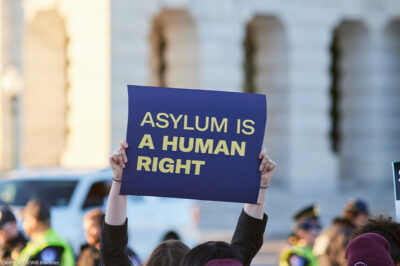Bills Would Ban Use of Secret Evidence
WASHINGTON — Two bills that are now pending before the House Judiciary Committee would bar the government from using secret evidence in cases against immigrants, Newsday reported.
According to Newsday, there are nine cases pending in which the INS is relying on secret evidence to detain and deport people. Overall, the INS has pressed about two dozen such cases, which tend to arise from questions about visas or immigration status.
Judges in such cases review the secret evidence, but the immigrant cannot.
Because the immigrant and his or her attorney do not know what evidence is being used against him or her, they are unable to refute it.
A person’s right to know what evidence is being used against him or her is a basic tenet of the legal system in the United States, said Lucas Guttentag, Director of the American Civil Liberties Union’s Immigrants’ Rights Project.
Immigration hearings are not criminal cases, however, and because of this immigrants do not have many of the protections granted to criminal defendants.
The 1996 Illegal Immigration Reform and Immigrant Responsibility Act and the 1996 Anti-Terrorism and Effective Death Penalty Act permit the use of classified information to detain or deport immigrants suspected of threatening the nation’s security. The shroud of secrecy is designed to protect national security and informants, the INS said.
But not everyone agrees using secret evidence is justified. There are two bills pending before the House Judiciary Committee that would bar the use of secret evidence in immigration cases.
The first measure, introduced by Rep. David Bonior (D-Mich.), would require that no evidence be held secret from an immigrant trying to avoid being detained or deported.
The bill, originally introduced last year, has 88 co-sponsors and bipartisan support that includes Reps. Bob Barr (R-Ga.) and Charles Rangel (D-Harlem). Also backing the measure are New York Reps. Peter King (R-Seaford), Gregory Meeks (D-Far Rockaway), Jose Serrano (D- Bronx) and Nydia Velazquez (D-Brooklyn).
“Under our system of government, the person being targeted has the right to defend his or her rights,” King said. “I have no doubt that the government fakes some of its evidence.”
Rep. Dana Rohrabacher (R-Calif.) introduced an alternative bill in June to address what he views as the original bill’s shortcoming — that it would bar secret evidence to be used against illegal as well as legal aliens facing INS proceedings. Rohrabacher’s bill would extend protection only to those here legally, spokesman Ricardo Bernal said.
The ACLU and other organizations backing Bonior’s version, disagreed with Rohrabacher, saying what is at issue is due process, not the status of an immigrant.
All parties involved in the pending legislation said that secret evidence disproportionately has been used against Arabs and Muslims. Numbers vary, but most show that all but one or two of the about 20 involved in such cases have been members of these groups.
The INS denied that it targets any specific ethnic or religious group. INS spokeswoman Karen Kraushaar said that the predominance of Arabs or Muslims in such cases is “completely coincidental.”
Stay Informed
Every month, you'll receive regular roundups of the most important civil rights and civil liberties developments. Remember: a well-informed citizenry is the best defense against tyranny.




